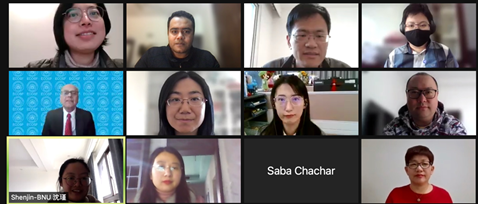ECOSF participated in the Second Belt and Road Cross-Regional Workshop for Teachers Professional Development on E-STEM
Go Back

ECOSF participated in the Second Belt and Road Cross-Regional Virtual Workshop for Science Teachers' Professional Development on E-STEM on February 19, 2022. The workshop was organized by ‘One Belt One Road environmental education centre’ and supported by International Exchange Centre of the China Association for Science and Technology (CAST), Children and Youth Science and Center (CYSC) of CAST, Research Institute of Science Education of Beijing Normal University and China Education Innovation Institute of Beijing Normal University.

The workshop aimed to bring together environmental/science educators from different countries and regions to develop and practice a series of E-STEM PBL courses, develop a group of teachers who can effectively implement E-STEM PBL, and promote the widespread use of E-STEM PBL in primary and secondary school. In the workshop, Participants across the region will jointly prepare and teach lessons on environmental topics, and exchange ideas and receive expert guidance.
A large number of science teachers and practitioners from China, Pakistan, Vietnam, Malaysia, and Thailand participated in the workshop. Subject experts on environmental and science education presented their ongoing science programmes at their respective schools and highlighted critical aspects and practices in the form of E- Science, Engineering, Technology and Mathematics (STEM) with an emphasis on Project Based Learning (PBL) and IBSE pedagogy. Participants had the opportunity the opportunity to learn from participating schools and forged strategies to develop E-STEM PBL course and implement the course under the guidance of experts.
Experts underscored that the climate change, ecological pollution, resource scarcity and other environmental problems become increasingly serious. They further discussed as to how the environmental education could be used to improve the future citizen’s environmental literacy, by raising the environmental awareness, skills and behaviours. Environmental issues are usually complicated and ill-defined. Therefore, environmental education is also interdisciplinary and usually includes science (S), technology (T), engineering (E) and mathematics (M).
President ECOSF Prof. Dr. Manzoor Hussain Soomro participated as an invited expert of science education and lauded the efforts by Chinese partners on promoting quality education around emerging challenges on environment and climate change. Prof. Soomro also commented on various programmes on environment by participating schools as presented during the workshop. Prof. Soomro concluded that employing methodologies, such as PBL or IBSE is critical to equip future generations with skills and tools and effectively prepare them for future challenges.
Earlier during the workshop, Engr. Khalil Raza and Ms. Saba Chachar presented a brief snapshot on the Climate Change Education project which is being undertaken by the ECOSF and supported by InterAcademy Partnership on Science Education Program (IAP SEP). This project aims to build the capacity of science teachers to effectively deliver the climate science contents to secondary and primary level students in Pakistan.